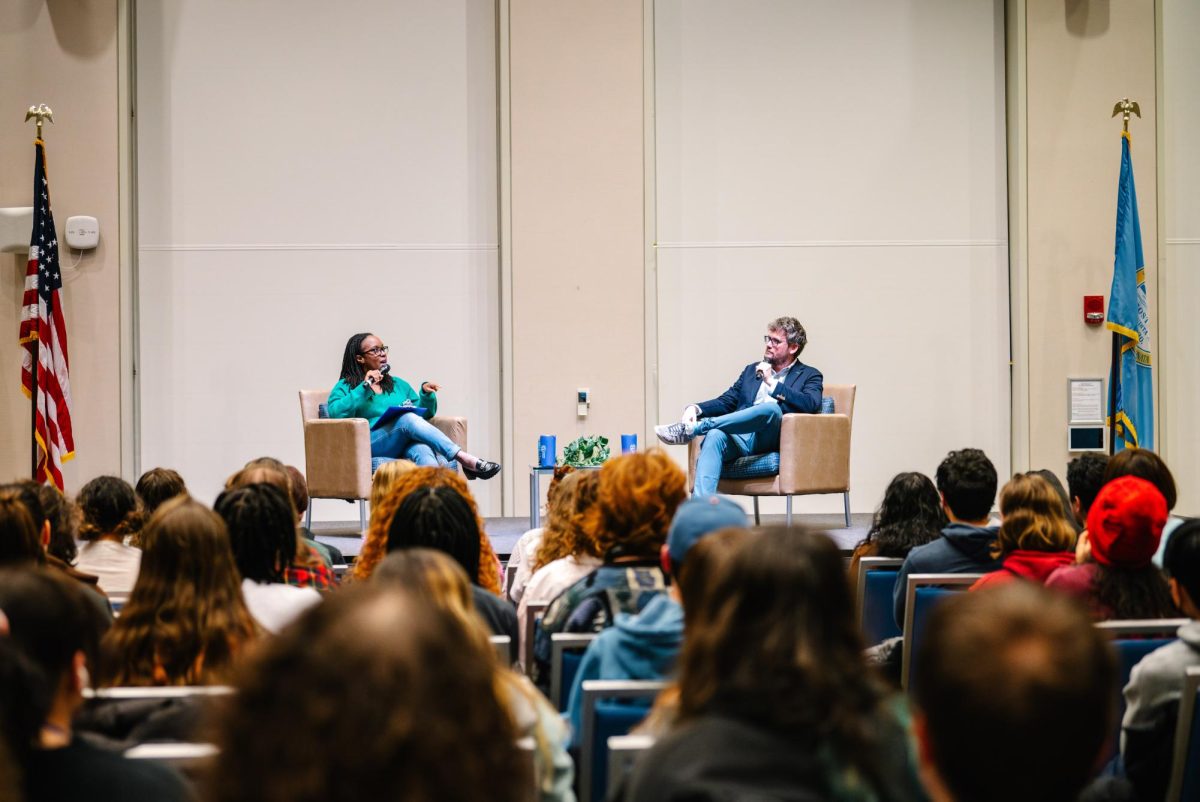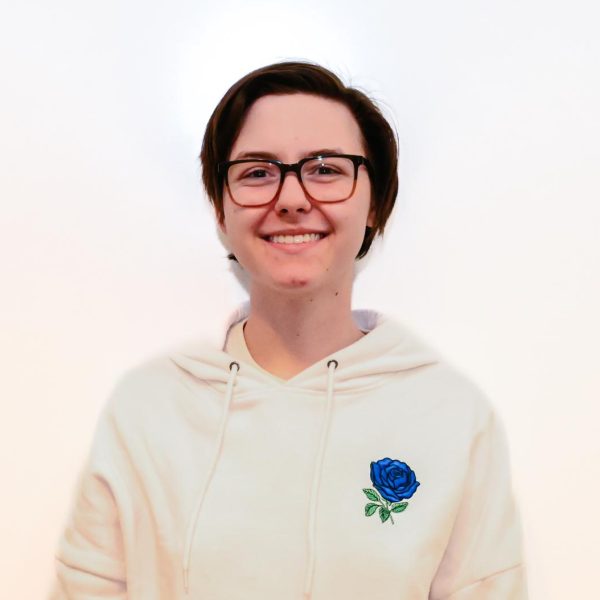On Friday Feb. 9, The Mass Media and the Student Arts and Events Council welcomed famed writer, creator and philanthropist John Green to a public conversation with local writer Amma Marfo. Marfo returned to UMass Boston after interviewing New York Times bestseller Jennette McCurdy for the school last winter. The two hosting groups sent in questions for Marfo to discuss with Green in front of a room crowded with students.
During this conversation with Marfo, Green spoke about his collaborator and brother Hank Green, the upcoming movie adaptation of his 2017 novel “Turtles All the Way Down,” and his fascination with death—and that’s just a few of the topics he covered. Here’s a rundown of the things Green had to say.
For his second foray into nonfiction writing, the “The Anthropocene Reviewed” author has been diving deep into the impact of tuberculosis in 18th-century Germany. This topic came up several times throughout the talk, proving Green’s devotion to the subject after his 2019 visit to a tuberculosis hospital in Sierra Leone, according to his YouTube.
Green knew he wanted to be a writer from a very young age. When he was in the third grade, he won a writing competition and got to go to the Florida Young Writers Conference in Tampa, Florida. According to him, it was the first time he’d felt like he was around other people with similar interests. He finally felt like he belonged.
Even then, his work was centered on mortality. His third-grade piece was titled “It Just Isn’t Fair,” and it was about death. His style hasn’t changed since then; in his words, more people should be talking about the massive problem that is human mortality. “Life only ends one way,” he said. “Worse than that, we know we’re going to die. We not only live in a world that ends—we live in a world that we know ends.”
Green remarks that this is a reality often grappled by young people, who recognize their mortality for the first time. “Imagine pitching death to an immortal being,” he said, “It’s weird, right?”
That’s why he loves to write about a good tragedy. One of the most common questions Green gets asked is a pleading “Why?!” once people read the endings of his novels; they’re certainly not for the light-hearted. He’s never been afraid to craft a story that resonates with young adult audiences, even if it means creating something real and devastating.
He wrote his first novel, “Looking For Alaska,” at age 22. He says to the audience, “If I can do it, so can you. I was your age.” Green started by writing in a perspective similar to his own. “We’re only looking through one set of eyes while we’re here,” he says. “It’s built into our language.” He enjoys exploring this dilemma in all of his novels.
Throughout his prolific career, Green has always had the same goal in mind with his novels. When writing, he says, he tries to articulate something so deep that words cannot reach it. He likes to apply words to what he calls word-less feelings. That doesn’t come easy, though; a lot of his process involves deletion. In his words, deleting large chunks of a rough draft is his favorite part.
Green acknowledges that this probably makes him an annoying collaborator. When collaborating on a work, Green said he likes to look at the shape of the story. “A story is like a double helix,” he said. “Once we both understand the shape of the story, it’s easier to figure out the rest.” When working with a collaborator, he has someone to bounce ideas off of, but when writing a story solo, he bounces ideas off his wife Sarah.
Sarah is responsible for the published ending of “The Fault in Our Stars.” Green explained that his original ending involved the protagonist, Hazel Grace, being tied to railroad tracks by her favorite author. “It was supposed to represent the train philosophy problem,” he said. “It was really bad.” Sarah encouraged him to explore a different ending to the story, one that would make a little more sense.
Green has made another curious choice in the last five years. He completely switched genres, from young adult contemporary romance to non-fiction. This change came because he “doesn’t know what fiction is supposed to do.” Obviously being a form of escapism is the first thing that comes to mind, but Green isn’t convinced. “TikTok is a better form of escapism,” he declared. “It’s designed to capture your attention.”
In other news, Green is releasing his latest book-to-movie adaptation, this time for his novel “Turtles All the Way Down,” to be released later this year. “‘Turtles All the Way Down’ has the most generous fans in the way they bring their lives into the story,” Green said. He spent the days filming on set to soak up the experience because he feels as if it might be the last time. And, in his words, it’s all been worth it. He’s more satisfied with the cast and directing than he’s been with any of his other film adaptations.
With so much under his belt, John Green is bound to go down in history. But none of that is what he wants to be remembered for. The most important thing, in his eyes, is love—being remembered for who we loved and who we were loved by. “The oceans are gonna boil,” he reminds the audience, nodding at the crowd of young, hopeful adults in front of him. “Love is the only infinite thing we can grasp.”
It’s a powerful sentiment, and John Green is a powerful speaker. His conversation at UMass Boston is sure to be one to remember for a long time.




